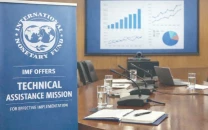Software for growth
Pakistan has attempted to address chronic macroeconomic imbalances by adjustment on the taxation side of the equation

Breaking Pakistan’s boom and bust cycle requires a software upgrade without donor assistance, not mega projects as monuments to growth. A key component in this endeavour is civil service reform. A cabinet meeting on Tuesday revealed that despite a reduced role under the 18th Amendment and resources under the 7th National Finance Commission (NFC) Award, federal expenditure has increased substantially. Some casually thrown up numbers at a presser show a jump from Rs175 billion in 2010 to Rs500 billion “between 2015 to 2017”. Now total federal expenditure is much higher. As the context was the rationalisation of the running of the civil side of the government, the reference must be to expenditure other than debt servicing and defence in the current expenditure.
The federal government is anchored on divisions headed by secretaries. Together these constitute the secretariat. In the field, there are departments attached to the divisions. Then there are autonomous/semi-autonomous bodies and corporations. Any rationalisation has to start with the divisions by bringing down their number in consonance with the quantum of devolution brought about by the 18th Amendment. In 2010, there were 48 divisions. In 2021, this number is barely down to 45. The mass promotions by the PTI government to Grade 22 has created a powerful interest to keep the number of divisions unchanged, if not increased. In 2001, the divisions numbered 34. At that time, the Committee on Rightsizing and Restructuring studied 30 of these divisions to conclude that operations would improve by reducing the strength to 21. It would have reduced expenditure by 35%. Although the number of Grade 22 officers was one less than the posts, the group ensured that the status quo was maintained. Now the number of Grade 22 officers exceeds the posts. Any change here is thus out of question. In effect, there are no proposals on the table. More attention is being paid to the officer/staff ratio in the divisions. In 2001, this ratio in some cases was found to be as bizarre as 1:8. A subcommittee involving Pakistan Institute of Development Economics (PIDE) and Management Services Wing had investigated the issue and recommended an average ratio of 1:2.5 after providing specialised training; otherwise it could be brought down to an average of 1:3.2. Some efforts were made in this direction, such that it stands at 1:4. The proposal is to lower it further to 1:3 by introducing e-filing and e-office system.
Over the past decades, Pakistan has attempted to address her chronic macroeconomic imbalances by adjustment on the taxation side of the equation. However, all that has happened is that the tax to GDP ratio has been stagnant for the most part. An occasional increase is also used up in government consumption rather than add to public investment. The singular focus on revenue mobilisation in inappropriate ways is killing private investment as well. It is perhaps time to leave taxation alone and shift the policy attention to rationalise the expenditure side of the equation. First, the gaping holes caused by the energy sector, SOEs, subsidies, tax expenditures should be ruthlessly plugged. This is a matter of software upgrade, not donor-funded reform projects. Second, except for education, health and social protection, the budgeting should be decremental rather than incremental. Expenditure decisions are largely political, requiring leadership. Unfortunately, the nature and the pace of civil service reform being pursued betrays weak political will that has also radiated to the overall agenda of reform. A software developed through local consensus, “The PIDE Reform Agenda for Accelerated and Sustained Growth”, was launched yesterday at the Planning Commission. Taking it seriously requires even harder leadership.
Published in The Express Tribune, April 23rd, 2021.
Like Opinion & Editorial on Facebook, follow @ETOpEd on Twitter to receive all updates on all our daily pieces.















COMMENTS
Comments are moderated and generally will be posted if they are on-topic and not abusive.
For more information, please see our Comments FAQ